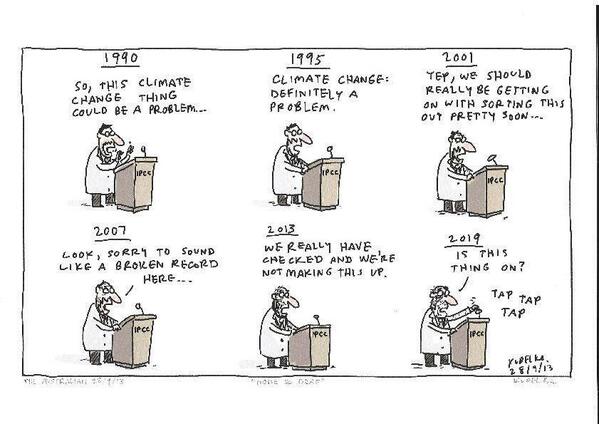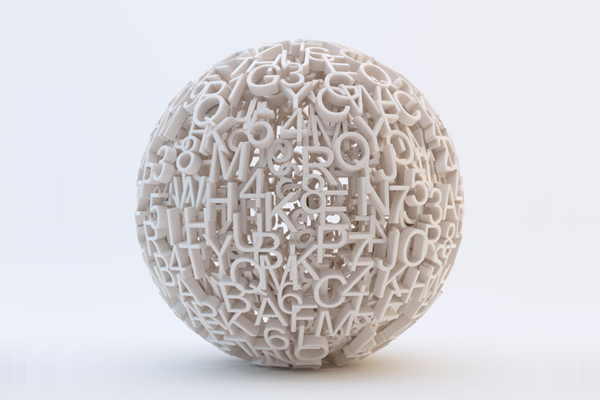When it comes to climate change, creativity is not optional. To retain a resilient and livable planet, we need to do things differently, better, and quickly. In light of our competing commitments to energy security and fuel prices, that means rethinking our ends, our means, and our conception of ourselves.
Despite my reservations about Adam's attack on the political class and my concern about creativity being hollow, I have enjoyed thinking about what it might mean to link our new agenda on climate change with our emerging worldview.
A broader conceptual discussion about creativity is needed, but for now, with creativity understood as self-directed, pro-active and innovative activity, here are some thoughts on what 'the power to create' might mean for attempts to tackle climate change.
Writ large, our current approach to climate change is passive rather than creative. Most of us follow the routines of our lives, point the finger at politicians, do a few tokenistic things like recycle or use our own shopping bags, demand cheap and secure energy without realising that's a climate position, hope for the best at big international climate summits and wait for another IPCC report or devastating storm before saying: isn't it terrible that nothing is happening? We can do better, and here are six ideas on how an emphasis on creativity might help:
1) Frame the power to create as a solution to stealth denial
If passivity is a large part of the problem of 'stealth denial' creativity may be part of the solution.
(Our report unpacks the claim that about two thirds of the population are in stealth denial on climate change, i.e. they accept the significance of human-caused climate change, but don't live as though they do.)
Creativity is about more than DIY, but I was struck by the importance of passivity as a contrast with creativity while reading George Monbiot's piece in today's Guardian:
"Almost universally we now seem content to lead a proxy life, a counter-life, of vicarious, illusory relationships, of secondhand pleasures, of atomisation without individuation...Perhaps freedom from want has paradoxically deprived us of other freedoms. The freedom which makes so many new pleasures available vitiates the desire to enjoy them... Freedom of all kinds is something we must use or lose. But we seem to have forgotten what it means."
Perhaps that's too rhetorical, but the idea seems sound: large chunks of the population have become so busy focusing on work, family, bill-paying, domestic chores, and entertainment, that we lack the requisite will, time and energy to think about - never mind act upon - 'bigger-than-self problems' like climate change.
Given that climate change is not exclusively 'an environmental issue' one role for creativity is to highlight the scope for people to act in ways that they might not have previously imagined to be relevant. This includes wasting less food, flying less, eating less beef, and a myriad of other micro behaviour changes. However, the point of our recent report is that we clearly need to connect such acts to a credible narrative about the big picture of continued fossil fuel production and steadily rising global emissions.
In that respect, you should find our who your MP is (most don't know) and tell them that climate change matters to you, but you might have more impact by finding a few hours of gumption to change your energy supplier and then use social media and email your friends and colleagues to explain why.
As far as possible (not always very far if you are in poverty, a full-time carer, unskilled etc) we need to seek to solve the problems of our lives rather than waiting for them to be solved for us.
What might that mean more tangibly? Others might disagree, but to me it points squarely to Shorter working weeks which means a revaluation of the core economy. Without that shift, most people simple don't have the time and support required to be more creative.
2) Get creative about our ends as well as our means.
If we are stuck with indefinite economic growth that is parasitic on undervalued and scarce natural capital as our chief measure of societal success, then the power to create is unworthy of the name. The 'power' in 'power to create' should be about contesting the rules of the game as well as playing it better.
The 'power' in 'power to create' should be about contesting the rules of the game as well as playing it better.
In this respect, is it not just sane to think we need a conception of economic maturity that connects to an idea of human rights and respects planetary boundaries? Can't we have a political discourse where people speak about economic decisions as if they are also social and ecological decisions, which they are? Getting seriously creative about how we conceptualise 'change' means breaking down the distinctions that falsely keep these dimensions of our world apart.
3) Place our hope in cities as well as States
Some say governments are now too small for the big problems (e.g. climate change) and too big for the small problems (e.g. anti-social behaviour), and the time of cities has come.
An uncreative approach to climate change is to wait for international agreements between states. Given the divergent economic needs, different energy reserves, vulnerability to climactic changes and range of national political systems, we are never likely to get a global agreement (that satisfies, say, USA, China, India, small island states, Norway, Russia) that goes beyond a firmer resolve to reduce emissions in principle(which is not to say we shouldn't try).
In the meantime we can act at levels where the impact is more tangible - cities. As Benjamin Barber put it in the RSA Journal:
"It turns out that about 80 percent of all energy is used in cities and 80 percent of global carbon emissions come from cities with more than 50,000 people. Therefore, if cities take strong measures – as well as Amsterdam, Los Angeles cleaned up its port and reduced carbon emissions by 30 percent to 40 percent - they will have a profound effect. Even if the US and China do nothing, cities can have a big role to play in fixing the problem. It's not just a theoretical thing."
The connection between cities and creativity is well established, and our hope for creative action on climate change may lie at this level of the Polis.
4) Trust creative artists to help communicate climate solutions
As this recent piece indicates (HT Jonathan Schifferes), climate communication has not so far been very successful, and there is a place for artists not just to change the message but also the medium: "People respond to authentic artistic expression, not scripted messaging. Artists need free rein. Businesses should take the plunge and give it to them."
This might sound a little worthy, but as indicated in 'Divided Brain, Divided World: Why the best part of us struggles to be heard', we are in danger of being over-literal and half-blind in our attention to the world, and we need artists of various kinds to help us retain a sense of balance and perspective: This cartoon helps put this point in perspective:

Perhaps 'power to create' is precisely what we need for the third industrial revolution.
5) Trust in a radical decentralisation of energy provision.
This point is covered in more detail as one of our eight suggestions for how to overcome climate stealth denial in the report (see pages 56-58):
Not only do we need a transition to renewables, but we need to design the energy
infrastructure in a much less centralised, vulnerable and remote way, as suggested by Rebecca Willis and Nick Eyre of Green Alliance:
‘Only 50 years ago, most households were directly aware of the amount of energy they used from the weight of coal carried into the house. Today it flows in unseen through pipes and wires, and embedded in the multitude of products purchased, most of which are manufactured out of sight from consumers. The pervasive attitude that new energy infrastructure should not be seen may well be one of the reasons behind opposition to
renewable energy installations. But a sustainable energy system will not be an invisible system. Reconnection of people with the energy system is a precondition for the low carbon transition.’
The power to create could be about that reconnection, with more homes being power plants, and more communities collectively managing their localised and renewable energy. Perhaps 'the power to create' is precisely what we need for the third industrial revolution.
6) Divest in centralised dirty energy and reinvest in decentralised renewable energy, thereby supporting the forms of innovation we need (see page 53-54).
If the power to create means challenging vested interests, the best way to do that is to move your money accordingly. The test of the RSA's resolve to challenge vested interest will be questions like this one.
These six ideas are a way of showing how 'the power to create' might help to flesh out what the call the action on climate change might mean. In essence the point is this: it's not hope that leads to action, but action that leads to hope.
Dr Jonathan Rowson is Director of the Social Brain Centre at the RSA and author of the recent report: A New Agenda on Climate Change: Facing up to Stealth Denial and Winding Down on Fossil Fuels. He Tweets @Jonathan_Rowson
Related articles
-
Blog: Trying to behave myself - a Social Brain Odyssey
Jonathan Rowson
In his final blog, Jonathan Rowson looks back on his time at the RSA and our behaviour change work.
-
New Report: The Seven Dimensions of Climate Change
Jonathan Rowson
A talent for speaking differently, rather than arguing well, is the chief instrument of cultural change – Richard Rorty
-
Seven Serious Jokes about Climate Change
Jonathan Rowson
Comedy is simply a funny way of being serious - Peter Ustinov




Join the discussion
Comments
Please login to post a comment or reply
Don't have an account? Click here to register.
Dr Rowson,
I was intrigued by the concept of stealth denial, of which I hadn't heard before:
"(Our report unpacks the claim that about two thirds of the population are in stealth denial on climate change, i.e. they accept the significance of human-caused climate change, but don’t live as though they do.)"
But the contradictory behaviour you describe here isn't really stealth denial.
It's stealth acceptance, isn't it?'
"Stealth" means covert. "Stealth denial" of a hypothesis surely implies that you internally DISBELIEVE it while externally acting as though you ACCEPT it.
(Fictional example: suppose someone minimises their carbon footprint religiously, but doesn't think carbon dioxide causes global warming. Obviously nobody would behave like this—it would be silly.)
Or have I misunderstood where the internal/external boundary lies—do speech acts, including answers to surveys, count as external, overt acts?
In which case the name "stealth denial" would make a bit more sense, if you mean to suggest that people aren't telling the truth when they say they accept the hypothesis, and that you can tell they're being untruthful from the way they live their lives? A kind of garden-variety hypocrisy, not really different from a person who claims to believe in Orthodox Judaism but eats seafood or pork every other day.
(A useful question for you, then, would be: how have we got into a situation where people who aren't convinced of a certain proposition feel reluctant to admit their doubts/disbelief? Isn't this kind of self-censorship normally associated with heresy under religious regimes or discontent under totalitarian states—or, at the most mundane, with MORALLY normative questionnaire items? If people have now come to think their moral goodness or badness hangs on their opinion about a complex scientific topic, that should disturb you.)
In any case this interpretation of "stealth" has its own problem, inherent in the way the data was collected: aren't you just taking people's word on how they live their lives? Why would they tell the truth about that, having already lied about Question 1? Why do you assume one "narrative" is honest and the other not?
In your linked article, you go into some more detail:
"We characterise 'stealth denial' in terms of those who accept the reality of man-made climate change but who agree with at least one of the following narratives (which are not mutually exclusive)."
Hang on—previously you said stealth deniers accept the "significance" of MMCC, but now they merely accept its "reality"?
These are two radically separate propositions.
Its "significance," when you use the word "significance," obviously means whatever implications you, Dr Rowson, believe it has.
It's "reality" simply refers to whether it's happening or not.
My mate accepts its "reality." (He doesn't accept its "significance" if that means accepting it's some kind of threat—it isn't, according to him. It's completely, ridiculously harmless in his view.)
But there's no doublethink, contradiction, incompatibility, dissonance or other irrationality WHATSOEVER involved in my mates's answering YES to any and all of these items:
"I don't feel uneasy about climate change";
"My daily actions are not part of the climate change problem";
"There is nothing I can do personally that will have any significant effect on limiting climate change"
It would be the silliest imaginable non-sequitur to assume that believing in man-made climate change logically obliges my mate to feel uneasy about it, feel that his daily actions are part of it, or feel that he could do anything significant about it.
(I hope such an assumption wasn't one of your premises, because that would make your work on the topic invalid.)
So there is nothing delusional (or even psychologically interesting) about my mate answering "yes, no, no, no."
Is there?
The public would be more impressed by the experts' pontifications on climate change if the experts practiced meticulous, rational and rigorous scholarship.
More collaboration between artists and scientists to inspire our cultural responses to climate change please. Scientific engagement, ethical responsibilities, relationships to the natural world - so many areas for an interdisciplinary approach. Here’s a few examples: http://drewwylie.net/category/...
Thanks for this. For me, I do think I do some good things to alleviate climate change - I haven't flown since 1998 and we use good energy (100% renewable supplier), but I'm very reluctant to communicate this to others. I say I don't fly cos I'm scared, or I use good energy because the price is good. I feel that others won't listen if I say I do these things because I believe that climate change is a significant threat. I perhaps wrongly perceive a backlash to any behaviour that comes across as holier than thou.
USE YOUR OWN SHOPPING BAGS ? Then they will produce some other useless plastic things people will throw away !!!! At least those plastic bags were used over and over by many people. From the grocery to store things then to be used a trash can liners in the bathroom. or to even keep things organized in the freezer.